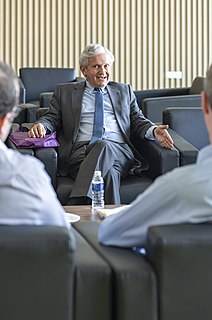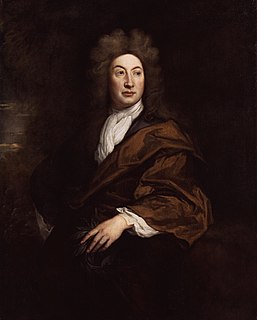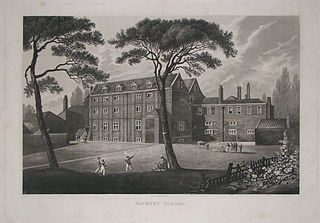Related Research Articles

The Keeper or Master of the Rolls and Records of the Chancery of England, known as the Master of the Rolls, is the President of the Civil Division of the Court of Appeal of England and Wales and Head of Civil Justice. As a judge, he or she is the second in seniority in England and Wales only to the Lord Chief Justice. The position dates from at least 1286, although it is believed that the office probably existed earlier than that.
Joseph Milner (1744–1797), an English evangelical divine, has a reputation particularly for his work on The History of the Church of Christ (1794–1809).

The British Critic: A New Review was a quarterly publication, established in 1793 as a conservative and high-church review journal riding the tide of British reaction against the French Revolution. The headquarters was in London. The journal ended publication in 1843.

The Poet Laureate of the United Kingdom is an honorary position appointed by the monarch of the United Kingdom, currently on the advice of the prime minister. The role does not entail any specific duties, but there is an expectation that the holder will write verse for significant national occasions. The origins of the laureateship date back to 1616 when a pension was provided to Ben Jonson, but the first official holder of the position was John Dryden, appointed in 1668 by Charles II. On the death of Alfred Lord Tennyson, who held the post between November 1850 and October 1892, there was a break of four years as a mark of respect; Tennyson's laureate poems "Ode on the Death of the Duke of Wellington" and "The Charge of the Light Brigade" were particularly cherished by the Victorian public. Five poets, Philip Larkin, Thomas Gray, Samuel Rogers, Walter Scott and Rudyard Kipling turned down the laureateship. The holder of the position as at January 2022 is Simon Armitage who succeeded Carol Ann Duffy in May 2019.

Justice of the Common Pleas was a puisne judicial position within the Court of Common Pleas of England and Wales, under the Chief Justice. The Common Pleas was the primary court of common law within England and Wales, dealing with "common" pleas. It was created out of the common law jurisdiction of the Exchequer of Pleas, with splits forming during the 1190s and the division becoming formal by the beginning of the 13th century. The court became a key part of the Westminster courts, along with the Exchequer of Pleas and the Court of King's Bench, but with the Writ of Quominus and the Statute of Westminster, both tried to extend their jurisdiction into the realm of common pleas. As a result, the courts jockeyed for power. In 1828 Henry Brougham, a Member of Parliament, complained in Parliament that as long as there were three courts unevenness was inevitable, saying that "It is not in the power of the courts, even if all were monopolies and other restrictions done away, to distribute business equally, as long as suitors are left free to choose their own tribunal", and that there would always be a favourite court, which would therefore attract the best lawyers and judges and entrench its position. The outcome was the Supreme Court of Judicature Act 1873, under which all the central courts were made part of a single Supreme Court of Judicature. Eventually the government created a High Court of Justice under Lord Coleridge by an Order in Council of 16 December 1880. At this point, the Common Pleas formally ceased to exist.
English county histories, in other words historical and topographical works concerned with individual ancient counties of England, were produced by antiquarians from the late 16th century onwards. The content was variable: most focused on recording the ownership of estates and the descent of lordships of manors, thus the genealogies of county families, heraldry and other antiquarian material. In the introduction to one typical early work of this style, The Antiquities of Warwickshire published in 1656, the author William Dugdale writes:
I offer unto you my noble countriemen, as the most proper persons to whom it can be presented wherein you will see very much of your worthy ancestors, to whose memory I have erected it as a monumentall pillar and to shew in what honour they lived in those flourishing ages past. In this kind, or not much different, have divers persons in forrein parts very learnedly written; some whereof I have noted in my preface: and I could wish that there were more that would adventure in the like manner for the rest of the counties of this nation, considering how acceptable those are, which others have already performed
Edward William Grinfield (1785–1864) was an English biblical scholar.

Newcome's School was a fashionable boys' school in Hackney, then to the east of London, founded in the early 18th century. A number of prominent Whig families sent their sons there. The school closed in 1815, and the buildings were gutted in 1820. In 1825 the London Orphan Asylum opened on the site. Today the Clapton Girls' Academy is located here.
The Monthly Mirror was an English literary periodical, published from 1795 to 1811, founded by Thomas Bellamy, and later jointly owned by Thomas Hill and John Litchfield. It was published by Vernor & Hood from the second half of 1798.

Robert Walpole (1781–1856) was an English classical scholar.
The Evangelical Magazine was a monthly magazine published in London from 1793 to 1904, and aimed at Calvinist Christians. It was supported by evangelical members of the Church of England, and by nonconformists with similar beliefs. Its editorial line included a strong interest in missionary work.
The Phytologist was a British botanical journal, appearing first as Phytologist: a popular botanical miscellany. It was founded in 1841 as a monthly, edited by George Luxford. Luxford died in 1854, and the title was taken over by Alexander Irvine and William Pamplin, who ran it to 1863 with subtitle "a botanical journal".
References
- ↑ "Fellows of the Royal Society". London: Royal Society. Archived from the original on 16 March 2015.
- ↑ Stephen, Leslie, ed. (1886). . Dictionary of National Biography . Vol. 6. London: Smith, Elder & Co.
- ↑ Stephen, Leslie, ed. (1886). . Dictionary of National Biography . Vol. 6. London: Smith, Elder & Co.
- ↑ "Butler, George (BTLR790G)". A Cambridge Alumni Database. University of Cambridge.
- ↑ "Worsley, Sir Richard". Oxford Dictionary of National Biography (online ed.). Oxford University Press. doi:10.1093/ref:odnb/5253.(Subscription or UK public library membership required.)
- ↑ "Clerk, Sir George, of Penicuick, sixth baronet (1787–1867), politician". Oxford Dictionary of National Biography (online ed.). Oxford University Press. doi:10.1093/ref:odnb/5613.(Subscription or UK public library membership required.)
- ↑ "William Daniel Conybeare". Oxford Dictionary of National Biography (online ed.). Oxford University Press. doi:10.1093/ref:odnb/6129.(Subscription or UK public library membership required.)
- ↑ Borrie, Michael. "Ellis, Henry". Oxford Dictionary of National Biography (online ed.). Oxford University Press. doi:10.1093/ref:odnb/8696.(Subscription or UK public library membership required.)
- ↑ Stephen, Leslie, ed. (1889). . Dictionary of National Biography . Vol. 17. London: Smith, Elder & Co.
- ↑ O'Connor, John J.; Robertson, Edmund F., "Benjamin Gompertz", MacTutor History of Mathematics archive , University of St Andrews
- ↑ Teugels, Jozef L. (2006). "Gompertz, Benjamin (1779–1865)". Encyclopedia of Actuarial Science. doi:10.1002/9780470012505.tag009. ISBN 0470846763.
- ↑ "Benjamin Gompertz". Oxford Dictionary of National Biography (online ed.). Oxford University Press. doi:10.1093/ref:odnb/10933.(Subscription or UK public library membership required.)
- ↑ Vaizey, John Savill (1892). . In Lee, Sidney (ed.). Dictionary of National Biography . Vol. 31. London: Smith, Elder & Co. p. 47.
- ↑ "Frederick Marryat". Oxford Dictionary of National Biography (online ed.). Oxford University Press. doi:10.1093/ref:odnb/18097.(Subscription or UK public library membership required.)
- ↑ "Murray Maxwell". Oxford Dictionary of National Biography (online ed.). Oxford University Press. doi:10.1093/ref:odnb/18408.(Subscription or UK public library membership required.)
- ↑
 Cousin, John William (1910), "Morier, James Justinian", A Short Biographical Dictionary of English Literature , London: J. M. Dent & Sons – via Wikisource
Cousin, John William (1910), "Morier, James Justinian", A Short Biographical Dictionary of English Literature , London: J. M. Dent & Sons – via Wikisource - ↑ "George Ormerod". Oxford Dictionary of National Biography (online ed.). Oxford University Press. doi:10.1093/ref:odnb/20836.(Subscription or UK public library membership required.)
- ↑ "Pearson, William (PR793W)". A Cambridge Alumni Database. University of Cambridge.
- ↑ "Primrose, Archibald John (Lord Dalmeny) (PRMS801AJ)". A Cambridge Alumni Database. University of Cambridge.
- ↑ Glasstone, Samuel (1947). "William Prout (1785–1850)". Journal of Chemical Education. 24 (10): 478. Bibcode:1947JChEd..24..478G. doi:10.1021/ed024p478. ISSN 0021-9584.
- ↑ "Rainier, John Sprat: certificate of election to the Royal Society". The Royal Society. Retrieved 16 October 2021.
- ↑ Lee, Sidney, ed. (1899). . Dictionary of National Biography . Vol. 59. London: Smith, Elder & Co.
- ↑ "Grant David Yeats". Oxford Dictionary of National Biography (online ed.). Oxford University Press. doi:10.1093/ref:odnb/30209.(Subscription or UK public library membership required.)